Junior
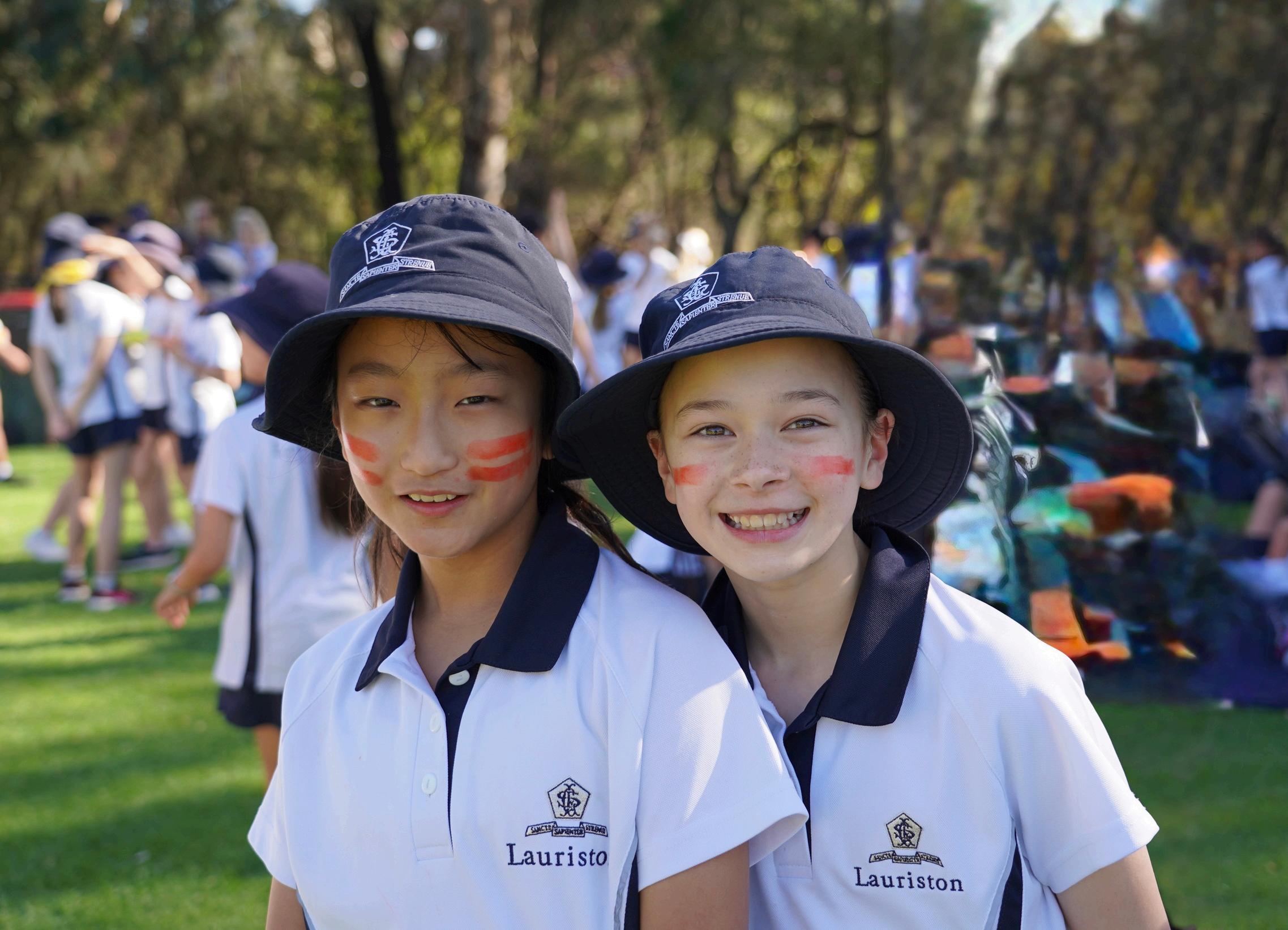
School
Lauriston Girls’ School - Handbook 2026
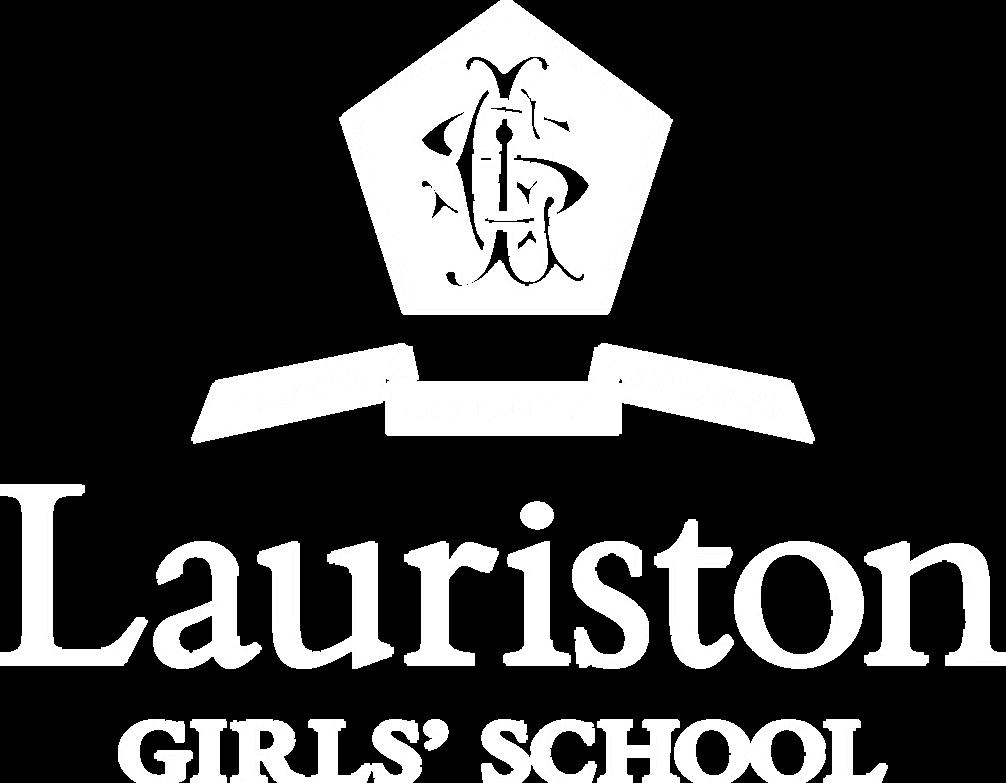


School
Lauriston Girls’ School - Handbook 2026

We warmly welcome you to the Lauriston community.
In the Junior School, we strongly believe that respectful relationships provide a solid foundation for life. We aim to foster and sustain positive and productive relationships between staff, students and families.
Lauriston acknowledges that each child is unique. Learning experiences provide for the variety of individual differences that make up each class through the development of stimulating and challenging programs. Learning is based on success for all, and children’s sustained efforts and achievements are acknowledged and valued. Continuous evaluation and reflection on the development and delivery of rich programs, ensures that all children are provided with the appropriate balance between challenge and support.
The Junior School is a learning environment where students feel respected and valued; a place where childhood is celebrated; a safe place of warmth, fun, joy and laughter, where learning flourishes.
The education of our students is a joint responsibility between parents and the school. By working together, we will endeavour to ensure your child’s years in the Lauriston Junior School are happy and rewarding.
Yours sincerely,
Chris Toms Vice Principal, Head of Junior School
Key Contacts
School Times
Junior School A – Z Times
Absences Thinking Skills from Prep to Year 6
Academic Care Structure Uniform
Assessment
Before and After School Care
Camps
Co-curricular Activities
Computers
Contacting Lauriston
Curriculum From Prep to Year 6
Core Subjects
Specialist Programs
Flexischools
Health and Wellbeing
Home Tasks
Individual Differences from Prep to Year 6
Inquiry Learning from Prep to Year 6
Lauriston Café: Refectory Rules for Purchasing
Leadership
Lunch Orders
Parent Communications
Photography
Safety
School Sport
Working With Children Check

Sabine Partington Principal

Chris Toms Vice Principal, Head of Junior School

Caroline Long Prep–Year 2 Teaching Mentor
Junior School Office

Deanne Read School Nurse
Main Reception (Huntingtower Road)
Health Centre
Lauriston Website
Schoolbox

Deborah Henderson Executive Assistant to Head of Junior School
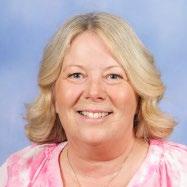
Karen Parker School Nurse

Kate Hehir Assistant PrincipalJunior School (Curriculum and Learning)

Dr Emma Steer School Psychologist
+61 3 9864 7568
juniorschool@lauriston.vic.edu.au
+61 3 9864 7555
+61 3 9864 7608
lauriston.vic.edu.au
schoolbox.lauriston.vic.edu.au
Flexischools flexischools.com.au
IT Helpdesk
assist@lauriston.vic.edu.au

Shayne Pollard Years 3–6 Teaching Mentor

School Psychologist
If a child is going to be absent from school because they are unwell, parents should call the Junior School office before 8.30am on 9864 7568. Alternatively, parents may register their child’s absence via the Lauriston App. If a student is absent and the school hasn’t been given notice, staff in the Junior School office will send parents a text message.
In terms of medical appointments, Lauriston encourages parents to make them during holidays or after school hours to avoid interruption to learning. Similarly, holidays are best organised during term breaks – if that is not possible, parents should notify the Principal in writing as far in advance as possible.









The School’s Prep, Year 1 and Year 2 program ensure the children’s first years of schooling are developmentally appropriate, catering for their natural curiosity and developing a love of learning. Staff provide a stimulating and happy environment designed to develop the students’ confidence and selfesteem, and at all times, encouraging their individuality.
The learning environment strives to:
• Recognise the unique stage of development of students of this age by providing appropriate experiences
• Provide ‘hands on’ and creative experiences to harness and expand natural curiosity
• Ensure solid foundations in literacy and numeracy are developed and reflect children’s individual needs, interests, and experiences.
• Promote positive relationships – learners learn more effectively when they feel positive about themselves and are able to establish good relationships



At this stage of the students’ education, staff gradually encourage greater independence, so the students ultimately take control of their own learning. Literacy and Numeracy continue to be an important focus. Students study integrated ‘Units of Inquiry’ on topics that help them to understand themselves and their place in the world, how the world works, and ways they can contribute.
At the same time, the students are learning how to learn, the value of focused inquiry and they start owning the learning process. Students enjoy a comprehensive specialist program and a range of extracurricular experiences.
From Prep, all students are grouped into one of four houses: Andrews (light blue), Irving (yellow), Kirkhope (red) and Mitchell (white). Through sporting and House competitions they continue to develop allegiance to their House throughout the year. New students will find out their House prior to the School year commencing.
Assessment is integral to all teaching and learning, and central to the School’s goal of thoughtfully guiding primary students through the five essential elements of learning: understanding concepts, acquiring knowledge, mastering skills, developing attitudes, and observing and responding to others in the classroom.
For students in the Junior School, assessment of their progress is an ongoing process in which staff gather information about achievement and performance, determine its significance, and make decisions about future learning. Using Australian ‘normed’ benchmark tests and interviews, teachers implement the learning program. They use other assessment strategies suitable to each age group to build a picture of each student’s knowledge, skills and attitude in all areas of the curriculum.
Teachers report on students throughout the year based on the following:
• Schoolbox • Semester 1 report
• Schoolbox
• Schoolbox • Semester 2 report
• Schoolbox
The school has before and after school care which is operated by Lauriston. The service is designed with working families in mind, ensuring parents can continue in their work environment without concerns about the safety and care of their children. Before school care operates from Monday to Friday, and is available from 7.30am. After school care operates from Monday to Thursday and starts from the end of the school day, finishing at 6.00pm.
The School grounds are supervised before school from 8.00am to 8.15am and after school from 3.10pm to 3.45pm. If your child arrives at school prior to 8.00am, they are required to attend ‘Before School Care’. If your child has not been collected by 3.45pm, they are required to attend ‘After School Care’.
If your child is involved in after school activities which commence after 3.45pm, they will need to attend After School Care or be supervised by an adult until their after school activity commences. Your child cannot be unsupervised in the school grounds before 8.00am or after 3.45pm. The safety of the students is always our priority.
To book your child, please complete the online OSHC booking request form. Families are able to check availability in our programs at any time either by email (oshc@lauriston.vic.edu.au) or calling Blairholme on 9864 7621. Spaces are subject to availability at all times.
From Year 3, students take part in the following outdoor education activities and gradually build their skills:
• Year 3: A two-day outdoor adventure camp at Lyrebird Park
• Year 4: A three-day outdoor education camp at Waratah Bay
• Year 5: A four-day camp to Sovereign Hill and an outdoor education camp.
• Year 6: A four-day trip to Canberra to investigate Australia’s political system, which complements the Year 6 unit of inquiry on democracy
• Year 6: A three-day outdoor education camp at Camp Toolangi (which also includes a visit to Howqua).
The Year 2 students have a sleepover held in the Junior Library in Term 4
Staff arrange Junior School excursions to enrich the educational, cultural and physical programs. They let parents know all the details via Schoolbox. There is no additional cost for these outings. Any parents wishing to help will need to have a current Working With Children Check.
Lauriston offers numerous co-curricular activities before and after school, and during lunchtimes.
Parents can find up-to- date information in the Co-curricular Activities Booklet. The Co-curricular Activities booklet for 2026 will be available for parents in late Term 4
New Year 5 students and new Year 6 students will be required to purchase an Apple Macbook for use in the classroom and at home. Information regarding this will be sent to parents.
Parents are invited to contact their child’s class teacher or specialist teacher if they have concerns or if they would like to know more about the class program.



The Junior School curriculum is comprehensive and offers lifelong learning opportunities. It is taught by caring and passionate teachers who nurture and challenge the talents of every student. The syllabus is broken down into core subjects and specialist program
The English program aims to develop students’ skills in speaking, listening, reading, viewing and writing, so they can use them with confidence, purpose and enjoyment.
• Reading: The curriculum encourages students to develop a curiosity and love of literature as reading affects all areas of learning. Children should read each night, supported in the home reading program by parents who model valuable reading behaviours and give staff feedback on home reading experiences. Through the program, students develop learn-to-read strategies.
• Writing: People use writing to create meaning, to explore ideas, to record actions and to communicate thoughts, wants and ideas. Writing is also a powerful tool of influence. In this component of the program, students learn to construct messages and represent their ideas, opinions, feelings, and information in print and digitally as a means of communicating.
• Spelling: Staff have a consistent approach throughout the Junior School. In the primary years, students develop an understanding of spelling strategies including phonics, incorporating auditory and visual patterns in the early years, understanding meaning-based spelling and spelling a bank of commonly used words. Teachers use SMART Spelling to develop literacy skills throughout the Junior School.
• Speaking and listening skills are developed through a range of oral activities and presentations.
Mathematics
Mathematics in the Junior School is made up of: Number, Algebra, Measurement, Statistics and Probability. As students work towards achieving the standards in mathematics they engage in a combination of formal, hands on, and open-ended experiences. The emphasis is on applying strategies and formally recording mathematical understandings, where teachers encourage students to explain their reasoning.
The daily ‘numeracy hour’ focuses on interactive teaching approaches, used within a whole class context. The typical format for numeracy hour is in three parts:
• Get ready to learn: Warm-up oral and number sense activities (5 to 10 minutes).
• Active learning: Investigating a problem or introducing a concept (30 to 45 minutes).
• Embed learning: Summarising and consolidating the lesson, clearing up misconceptions (5 to 10 minutes)
Students gradually develop knowledge and skills using concrete materials in real life and hands on activities, creating a foundation upon which they can build more abstract mathematical ideas and concepts. Teachers draw on students’ knowledge of the world, and ways of learning at all levels across the School, to ensure that moving to more abstract mathematical thinking is interesting and meaningful.
Science is timetabled weekly. Students are encouraged to see the sciences as having purpose and relevance to their lives and to develop at a young age a positive view that science in all its forms is accessible to everyone
There are also co-curricular opportunities to promote science to students who demonstrate a real commitment to its fields. These include STEM-based programs (integrating the disciplines of Science, Technology, Engineering, and Mathematics), competitions, lunchtime clubs, and robotics.
Information Technology is an integral part of the teaching and learning program from Prep to Year 6. Teachers encourage students to use technology confidently and effectively to acquire, process and communicate information and to explore creative ways of transforming data. In the classroom, technology is used as a teaching and learning tool across all areas of the curriculum, helping students access, store, retrieve, organise, collaborate, and present information.
From Prep to Year 4, each student is allocated an individual iPad to use in the classroom, with varied opportunities to use the camera, microphone, and a range of educational apps. Seesaw is used to share learning experiences with families. In Years 5 to 6, students use Macbooks to support their learning. This is also the stage where they are introduced to Microsoft Teams and Office 365 tools such as OneDrive and Word.
Students across the Junior School also have access to a range of peripheral technologies, including Lego EV3 Robots, Sphero, Beebots and green screen equipment. They also use the design process to complete projects that make use of laser cutters and 3D printers available in Lauriston’s Fabrication Laboratory.
Digital wellbeing is an important aspect of technology education. Students participate in dedicated lessons to raise their awareness of privacy, digital identity, cyberbullying, and copyright. These are supported through guest speakers, digital wellbeing programs, and classroom-based projects.



From Prep to Year 6, all students attend specialist programs in the areas of Physical Education (PE), Music, Mandarin, French, Visual Arts, and Library. Drama becomes a specialist program from Year 4 to Year 6.
Physical Education (PE)
Lauriston recognises that exercise and movement are key to a healthy lifestyle. It encourages full participation in PE and Sport for all students in the Junior School, providing opportunities for the students to:
• Understand and practise the skills necessary to participate in a wide range of physical activities.
• Understand the importance of health and fitness
• Understand the skills and rules specific to particular sports so they can experience success
• Participate in and experience enjoyable physical activities regardless of their ability.
• Develop and foster good sporting attitudes and a high standard of sporting behaviour relating to self-control, discipline, cooperation, tolerance, and respect for others
• Be involved in activities such as House Swimming, Athletics and Cross-Country Carnivals to encourage House and School spirit.
• Try out for District competitions, a pathway to the State Championships.
The PE curriculum covers the following:
Fundamental Motor Skills
Swimming
Gymnastics and Dance
Minor games
Athletic skills
Hockey
Tee ball
Music
Basketball
Tennis
Soccer
Skipping
Volleyball
Cricket
Netball
A Music Program based on Kodaly and Orff philosophies of Music Education begins in Prep. This foundation is built upon throughout the Junior School years. Students in Years 2 and 3 study a string instrument as part of the classroom Music Program.
In Years 3 and 4, students attend a fortnightly singing-based musicianship class and in Year 5 a compulsory Band Program runs for one semester.
Throughout Junior School, students are invited to join a range of co-curricular ensembles and choirs which rehearse before and after school or during lunchtime.
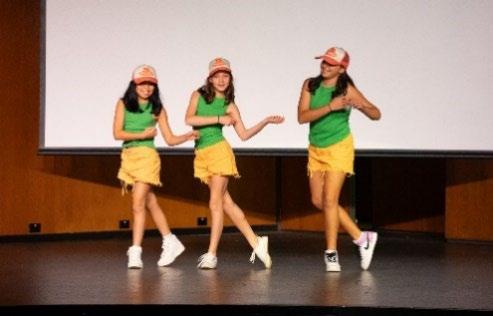


The Lauriston Music Department offers private Instrumental lessons on a wide range of instruments. Enrolments are completed via the Music page on Schoolbox. Lessons are conducted during the school day and students come out of a class on a rotating timetable.
Through the visual arts, students explore many ways of experiencing, developing, representing and understanding ideas, emotions, values and cultural beliefs. They learn to take risks, be imaginative, question prevailing values, explore alternative solutions and engage in artistic criticism. Further, they can develop, practice and refine techniques, share opinions and extend the limits of currently accepted parameters.
This subject focuses on developing the students’ ability to discuss, make and appreciate art. The emphasis is on enjoyment while skills both existing and new are practised, extended and refined.
To this end, a wide range of media and materials are provided. Students are encouraged to explore the creative nature of these materials along with their own sense of imagination. Additionally, crosscurricular activities between the art room and the classroom occur at various times throughout the school year.
The Junior Library is a well-resourced facility with a teacher-librarian and a part-time assistant. It is open most days from at 8.00am until 3.30pm, including most lunchtimes. All Junior School classes have a library lesson that covers borrowing, literature appreciation, and research skills. The students learn via literature to question prevailing values, explore alternative solutions, and engage in literary criticism. Students recommend personal reading to their friends and can request books to be added to the shelves.
As part of the library program, students participate in Book Week in which they can enter writing, drawing, and reading competitions and participate in a dress-up parade. They also enjoy a book sale and visits by authors and illustrators who run talks and workshops.
French is taught using the AIM (Accelerative Integrated Method). This is a highly accelerative language teaching method that uses music, dance, gestures and theatre to support learning. In this way, they are able to practise the five macro skills of listening, reading, speaking, writing and viewing.
AIM classes are highly interactive, and students are speaking in the target language for the entire class. Often, they are also asked to gesture as well. They stand up and move, dance and sing in every class.
In addition to a strong focus on oral language development, students will also develop written language skills through work with story and drama. At the end of each level, students will present a play in French. They will also have completed a workbook of scaffolded written language activities.
The Chinese program is aligned with the Australian Curriculum and is designed to provide students with a comprehensive foundation in both language acquisition and cultural understanding. The program places equal emphasis on developing practical communication skills and fostering an appreciation of Chinese traditions, customs and contemporary society.
Students will learn to read and write in Pinyin, the Chinese phonetic system, and will develop an understanding of its differences from the English alphabet. They will also be introduced to basic Chinese characters and will learn to construct commonly used phrases and sentences for everyday communication.
The Accelerative Integrated Method (AIM) and a range of visual and audio resources – including songs, chants, rhymes, and interactive activities – will be used to enhance listening and speaking skills. Through this integrated approach, students will build confidence in using the language and gain valuable insights into Chinese culture.
Students in Year 4-6 explore a range of drama skills for performance. Students will explore the important questions who, where and when. Through improvisation, storytelling and theatrical styles, students will present and make theatre collaboratively. The program links into classroom topics and themes, and each term builds on the students’ skills, through group play supported by props, costume, music and text. Each year, Years 5 and 6 students have the opportunity to perform in a play or musical.
EAL support is provided for students from language backgrounds other than English. EAL teachers assist these students to improve their reading, writing, speaking and listening skills through in-class support and targeted small group tuition. After-school EAL classes are offered to students who require additional support in Years 1 to 6.
Lauriston does not permit students to bring cash and, in a move to a cashless system for student purchases, we introduced Flexischools. Flexischools is used for Café items, as well as other student items and activities.
All parents must set up an account for their child by on the Flexischools website; this account is linked to their child’s student ID card. Please contact Flexischools directly if you have any issues.
Student in Years 5 and 6 are issued a photo-ID card that they can link to their Flexischools’ account. They may use this card to purchase breakfast and lunch from the cafe.
Lauriston is fortunate to have registered nurses and psychologists onsite to help provide immediate care for your child should the need arise. They have a close working relationship with each other, optimising the quality of care delivered.
Several teaching staff also have basic first aid qualifications and will oversee first aid on camps and excursions. The Health Centre is open from 8.00am to 3.00pm, and school psychologists are contactable during school hours.
Students should not present to school if they are unwell. They must remain at home until their health issue has resolved completely. Students who feel unwell while at school, should present to the Health Centre to be seen by the School Nurse.
On rare occasions, it may be a trained first aider operating the Health Centre.
The School Nurse will contact parents of children presenting to the Health Centre at their discretion, and on occasions may ask that your child be collected from the Health Centre and taken home, or for further medical treatment. It is imperative that contact details, including those emergency contact details are kept up to date.
If your child has a medical condition that requires an action plan (e.g. anaphylaxis, asthma, diabetes or epilepsy), it is a school requirement, and in some instances a legal requirement, that these are reviewed and updated yearly. Please forward these directly to the Health Centre. It is an expectation that your child has an in-date supply of treatment medication available for their use at all times while at school. In most instances these will be held in the Health Centre.
Please make contact with the School Nurse directly if your child’s health status alters in anyway during their schooling years at Lauriston Girls’ School. This will enable your child’s medical records to be updated, and optimal care provided if ever required.
Students must not self-medicate while at school. All medication must be handed to the School Nurse in the original packaging. The School Nurse will administer as per the Medication Authorisation Form.
The form can be downloaded from Schoolbox and is to be completed by a parent/guardian and forwarded to the School Nurse/Health Centre, along with the medication.
Students suspected of concussion while at school or a school sanctioned activity, must be collected by parents/guardian as soon as possible once contacted, and taken for immediate medical review. If a student is diagnosed with concussion, regardless of whether the incident occurred in or outside of school hours, it is expected that students only return to school with medical clearance and a Return to School Plan. The plan is to be forwarded to the Health Centre on return to school. Refer to ‘Concussion Management and Minor Head Injury’ policy. Students should not return to sport until they have successfully returned to school. A second medical clearance letter must be provided prior to returning to full contact practice.
From time-to-time head lice present a problem at every school. Parents/guardians can help minimise the problem by:
• Regularly checking their child’s head with comb and conditioner
• Notifying the School as soon as eggs or lice are detected.
• Treating their child’s hair on detection, followed by a second dose as per the packet instructions, usually seven days later.
The School Nurse will contact parents to collect a student if they have been found to have live lice in their hair. The student may return to school once effective treatment has begun.
The purpose of home tasks is to encourage students to take responsibility for their own learning, and to develop self-discipline and independence in the learning process – starting at primary level.
The aims of the home learning program are to:
• Provide positive communication between the School and home.
• Promote an understanding of the School program.
• Develop time management and organisational skills.
• Foster and develop independent, regular study habits.
• Provide an opportunity for students to take responsibility for their learning.
Time Allocated to ‘Home Tasks’
• Prep and Year 1: Students should read with parents every day (reading themselves and being read to) and make the most of real-life numeracy opportunities (counting and simple adding and subtracting).
• Year 2: In addition to the activities at Prep to Year 1 level, students should undertake varied word-study and simple maths exercises. As a guide, they should do this Monday to Friday for 15 to 20 minutes.
• Years 3 to 6: Reading and literature are important aspects of the program at this level. Students are expected to spend time on private reading every night. Teachers also encourage students to practise their times tables and personal spelling words.
In addition, we recommend the following time commitment four nights a week for specific home tasks:
• Year 3: 15 minutes
• Year 4: 20 minutes
• Year 5: 30 minutes
• Year 6: 40 minutes
Home tasks can be set by specialist teachers (for example Mandarin), and classroom teachers take this into account, so that students are not overburdened.
Parent Role
To ensure students get the most out of their Home Tasks, the School asks parents to:
• Be involved in the reading at home program by listening to, reading with, and reading to their children (in equal amounts).
• Check that the work recorded in the diary is completed.
• Write a note in the diary or contact the teacher if they perceive any problems.
• Ensure children complete home tasks thoroughly and completely.
• Discuss and guide but avoid the temptation to do the tasks themselves.
Lauriston provides a differentiated program within the classroom to cater for a range of students’ abilities and needs. The role of the Individual Differences teachers is to provide and support the students through a variety of programs such as MiniLit, MacqLit, Sounds-Write and Emu Maths. Students are also given the opportunity to fulfil their potential through special classroom projects and events such as Maths Olympiad, ICAS (an independent skills-based assessment program), Australian Mathematics Competition, Writer’s Festival and Spelling Bees
In a rapidly changing world, young people must become proficient at selecting, critiquing and applying their learning. Inquiry learning therefore seeks to help the students grow into inquiring and resourceful individuals who can demonstrate what they know. Within the Junior School, studies of Humanities, Design Technology, Science, Health, Digital Technology – as well as philosophical discussions – are incorporated into integrated units of inquiry. Students form their own questions about a topic and have time to explore the answers. They use the processes of English, Mathematics and the Arts to develop and express their understandings.
Many students are involved in sport before school. If your child is involved in sport before school, they are welcome to purchase breakfast from the Refectory.
• Prep to Year 2: Students are not involved in sport before school.
• Years 3 and 4: Parents may order breakfast via Flexischools (orders need to be placed by 7.00am).
• Years 5 and 6:
o Parents may order breakfast via Flexischools (orders need to be placed by 7.00am), or
o The students can purchase over the counter with their Student Card. However, we encourage parents to make a breakfast order via Flexischools to ensure that the item of their choice is available.
Recess
• Prep to Year 6: Students are not permitted to purchase food at Recess.
Lunchtime
• Prep to Year 4: Parents may order lunch via Flexischools which will be ready for your child at lunchtime. Please note that Prep to Year 4 students are not permitted to purchase items at lunchtime. Parents are reminded that they need to place lunch orders before 8.00am each day.
• Year 5 and 6:
o Parents may order lunch via Flexischools (orders need to be placed by 8.00am), or
o Students can purchase over the counter with their Student Card.
o Please note: Year 5 and 6 students may only purchase items for themselves, not for any other students.
The Café is not open after school. We would like to remind parents that the café is cashless.
If parents would like their child to share a birthday treat with her class, they should speak to their class teacher. Small cakes and items that can be easily distributed are more suitable than a large cake. Lollies are not appropriate. When it comes to invitations, to avoid causing offence, parents should not distribute them at School. The class list is the best source of contact details.
Throughout the Junior School, there are numerous opportunities for students to learn about leadership and to take on positions of responsibility in their classroom and within the broader School. By giving students a chance to lead, Lauriston encourages them to assume a positive place in an evolving global and democratic community – preparing them for life generally.
At the beginning of each year, many year levels undertake a unit of inquiry that seeks to understand relationships in line with the school values. Students learn about relating to friends, peers, teachers and other adults, and about different ways to be a leader in cooperative groups.
Prep to Year 6 students can be elected representatives on the Student Representative Council (SRC), which meets regularly to discuss School issues. Students hold their positions for one semester.
The Year 6 students lead the Prep to Year 6 assemblies in the Irving Hall. Parents are very welcome to attend these assemblies. Assemblies are a way for the Junior School to function as a whole community and provide opportunities for student leadership.
In Year 6, the students are given more specific student leadership opportunities – for example special duties, leading activities in the classroom, and performing and leading activities at assemblies. The Year 6 leadership program is based on a ‘distributed leadership’ model that allows every student in the final year of primary school to hold a position of responsibility to unlock the leadership potential in all.
The Year 6 leadership experience is designed to:
• Embrace all members of the year level as leaders.
• Lead to the empowerment of individuals.
• Value the contribution of individuals
• Offer each student new opportunities to develop their own leadership style and skill set
• Enhance the range and quality of student learning by expanding students’ capacities.
• Demand a commitment by each student to learn and develop.
• Provide opportunities to show initiative, be creative, and risk take
• Earn students the respect of others through their actions
• Expose students to decision-making processes that will allow them to reflect on their own values and beliefs, making them more self-aware.
• Encourage collaboration and teamwork.
Students eat lunch supervised by a class teacher. Students can bring their lunch from home or buy it through the cafe using a Flexischools account. The menu and prices are updated each term and are available on Schoolbox. Parents should explain to their child that they have a lunch order and remember to send a snack or piece of fruit for recess.
We encourage all the students in the Junior School to be a Nude Food champion. To achieve this, your child’s lunchbox needs to contain no wrappers and no glad wrap. All food must be stored in either plastic containers, a thermos, or a lunchbox with compartments. Our aim is to reduce the amount of rubbish we put into the bin. We also want to raise an awareness of ‘care and respect’ towards our planet Earth.
The benefits of Nude Food include:
• It’s healthier
• It saves landfill space
• It helps the environment
• It creates good habits
Parent Communications
Junior School staff have frequent contact with parents, updating them on current activities and discussing their child’s development. All forms of communication are important links in the school/home partnership.
Diaries
Students in Years 2 to 6 are given a school diary early on in the school year.
In Year 2, the diary is sent home daily. Parents should check the wallet every night for notes and notices and make sure it is sent back to school each morning with their child’s take-home readers and student planner.
Years 3 to 6 students use the same system, although in Years 5 and 6, students locate their home tasks on Microsoft Teams – an online system that provides students with resources and administrative information associated with their subjects.
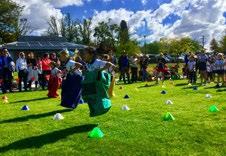

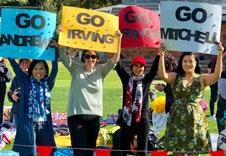
Early in Term 1, teachers meet with parents to share information about their child’s wellbeing and to ensure the teaching and learning program best suits their needs. Teachers also make themselves available for appointments throughout the year. Parent teacher interviews are also held early in Term 3.
Using Schoolbox, parents can track their child’s progress on the assessment tasks they have completed for each subject and make direct email contact with her teachers. To access your child’s academic results online, families are issued an individual login.
The school holds information evenings early in Term 1 for staff to outline the educational philosophy and the program of work
Lauriston Life is the school’s biannual magazine, featuring articles from Early Learning Centre through to Senior School. It also features wrap ups of events, news from the Old Lauristonians’ Association and student achievements.
A copy of the yearbook, the Lauristonian, is sent home at the end of the year.



Professional photographers take individual and class photographs in Term 1 each year. The cost is included in School fees
To keep students safe, it is school policy that no Junior School child remain in the school grounds unsupervised. Lauriston asks parents to help by directing children safely into care. All students arriving at school before 8.00am must go to Before School Care. At the end of the day, children waiting for cocurricular activities must either attend after school care or be taken into the care of their parents.
Any unsupervised part of the school grounds remains out of bounds to children who have been dismissed for the day and are waiting for parents or the start of co-curricular lessons
In addition to programmed PE lessons within the specialist curriculum, the Junior School offers the following House sporting activities:
• Cross country – Term 1
• Athletics – Term 2
• Swimming – Term 4
Students who are 9, 10, 11, 12 or 13 years old are eligible to compete in competitions run by Schools Sport Victoria (SSV). The competition is for students who meet the criteria for team selection in various sports. The association provides opportunities for students to compete at different levels depending on their capabilities and level of achievement, for example at district, division, regional, and State events.
The school conducts the following sports as a co-curricular activity:
• Running Club
• Snowsports
• Cross Country training
• Learn to dive
• Athletics training
• Netball
• Hockey skills development
• Swim squad
• Yoga
• Water polo skills development
• Diving squad
• Basketball
There may be additional activities run by external agencies. Parents should refer to the Co-curricular Handbook.
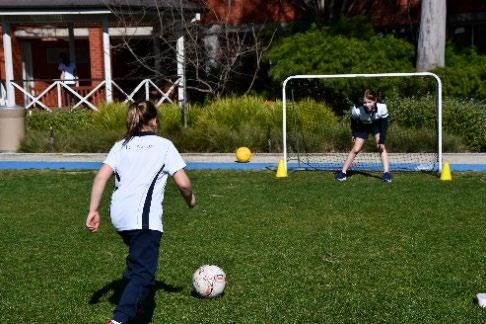


Staff supervise children on school grounds from 8 00am until 8 15am when classrooms open. Learning begins promptly at 8.30am. Parents should avoid arriving late in the morning as it means the school day doesn’t start smoothly. Children who attend school regularly and on time are more likely to adjust and progress easily, to develop independently, and to be less stressed at the beginning of the day.
Punctuality also shows respect for other students and the teacher.
At the end of the school day a teacher supervises students at the Mercer Road gate until 3 .45pm, and any child not collected by this time will be taken to after school care.
Drop-off and Pick up (Prep – Year 6)
• 8.00am – 8.15am: Students are to be dropped off at the Mercer Road gate (Tiger Turf).
• 3.10pm – 3.45pm: Prep to Year 3 students can be picked up at the Mercer Road gate (Tiger Turf).
• 3 20pm – 3 45pm: Years 4 to 6 students can be picked up at the Mercer Road gate (Tiger Turf).
Australia has the highest incidence of skin cancer in the world. Skin damage, including skin cancer, is the result of cumulative exposure to the sun and most of the damage occurs during childhood and adolescence. Under the School’s Sun Protection Policy, the School ‘bucket hat’ is a compulsory item of clothing for all students and must be worn in Terms 1 and 4. Parents can buy hats at the uniform shop. Staff also ask parents to apply sun cream to their child each morning before school – it is parents’ responsibility to do this.
7.30am - Before School Care begins (All students arriving before 8.00am must attend Before School Care)
8.00am - Students arrive and are supervised until 8.15am
8.15am - Student enter classrooms
8.25am - Prep – Year 3 Classes commence
8.30am – Year 4 – Year 6 Classes commence
Morning Session: 8.30am – 12.30pm
10.30am - Recess begins
11.00am - Recess ends
12.30pm - Eating lunch
12.45pm - Lunchtime
Afternoon Session: 1.30pm – 3.15pm
1.30pm - Afternoon lessons begin
3.10pm - Dismissal for Prep to Year 3
3:20pm - Dismissal for Years 4 to 6
3.45pm - Students still remaining at school will be taken to After School Care

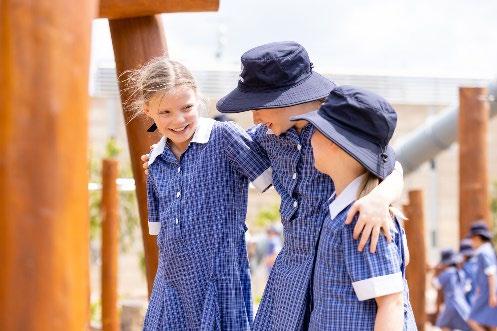

The curriculum incorporates thinking skills from Kindergarten through to Year 6 as follows:
• Reasoning, processing and inquiry: Students collect information from primary and secondary sources to answer their own and others’ questions, challenging the validity of sources when appropriate. They apply thinking strategies to organise information and concepts in different contexts, including problem-solving activities. They provide reasons for their conclusions.
• Creativity: Students apply creative ideas in practical ways and test the possibilities of the ideas they generate. They use open-ended questioning and integrate information to explore ideas.
• Reflection, evaluation, and meta-cognition: Students identify the strategies they use to organise their ideas and use appropriate language to explain their thinking. They identify their point of view and justify changes in their thinking.
The student diary has a complete list of the school uniform, or refer to the Uniform Handbook The school expects the uniform will be correct, clean, and in good repair and asks parents to help maintain high standards of general appearance. Teachers make periodic uniform checks. The following rules apply to uniform in the Junior School:
• If hair touches the shoulders, it must be tied back in a navy-blue band or ribbon.
• School bags and backpacks marked with the school crest can be bought from the uniform shop.
• Students must wear full school uniform when they are in public and when they are travelling to and from school; this includes blazers for Years 3 - 6. On hot days, the students are not required to wear their blazer home and may carry it home instead.
• Straw hats are a compulsory part of the uniform in summer. In line with the School’s Sun Protection Policy, students must always wear sports hats and straw hats in Terms 1 and 4.
• We would like to inform you that your child may wear their Sports uniform to school on any day/s when they have PE (during the school day) or Sport (before or after school).
• While there are a variety of different scenarios, below are some examples which may clarify questions parents may have:
o Example 1: If your child has PE during the school day, they may wear their Sports uniform to school and remain in it for the entire day. They are not required to bring her school uniform to school.
o Example 2: If your child has netball before school, they may wear their Sports uniform to school and remain in it for the entire day. They are not required to bring school uniform to school.
• All garments, sports equipment, pencils and articles such as school bags, purses and books must be clearly marked with the child’s name. Sports uniforms and smocks are sent home each Friday for washing, and parents should ensure they are returned, clean, on Mondays.
• The only pieces of jewellery permitted are a watch and plain gold or silver ear studs.
• Students are expected to wear the full sports uniform to all PE classes and sporting events. It is expected that all students wear their full sports uniform when leaving the school grounds for sporting activities.
Lauriston operates the Uniform Shop during the term on Tuesdays and Thursdays from 9.30am to 4.30pm. Additional open times are published via Schoolbox. Uniform items can also be ordered online
The LPA operates the second-hand uniform shop and proceeds are included in LPA fundraising for the school. Trading hours during term are 1.30pm to 4.30pm on Thursdays.
To make it easier for misplaced items to be returned, all garments must be clearly named. Lunch boxes and bags need to be clearly labelled, as well as all items of clothing including underwear, socks and shoes as the students change for swimming and sport. Parents should encourage their child to put clothing into lockers or bags. Staff make every effort to trace items of lost property; they place any articles that are not claimed in the lost property box near the Junior School Office.
Lauriston takes the protection of children seriously and we are committed to providing a safe environment for all of our students. Lauriston has systems and procedures in place to ensure all children in our care are safe and we continue to review these as we implement the Child Safe Standards. If parents would like to accompany classes on excursions, they are required to have a WWCC –applications can be found online or at Australia Post. This WWCC needs to be submitted to the Executive Assistant to Head of Junior School.

